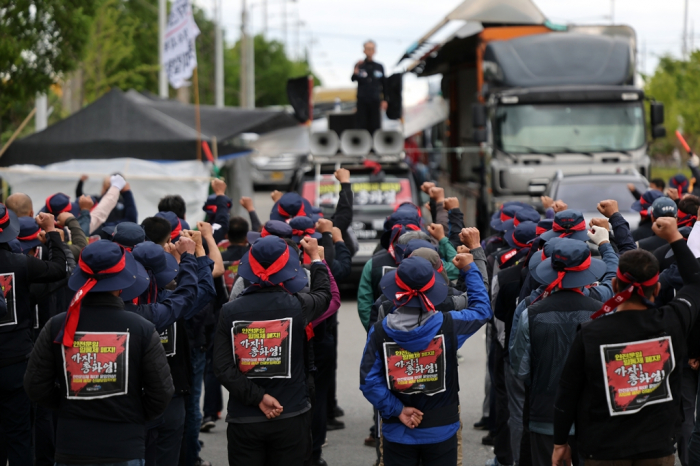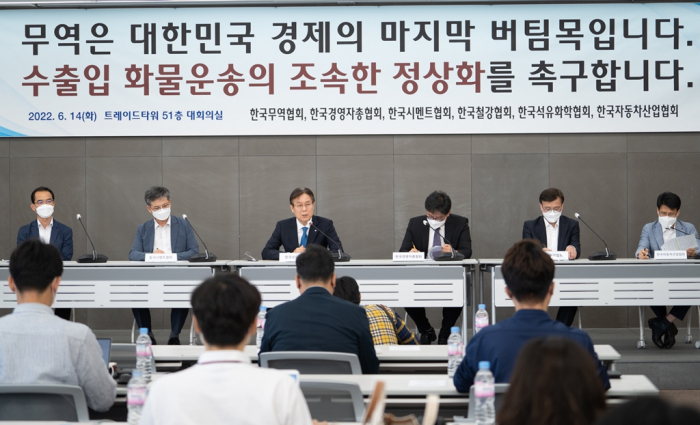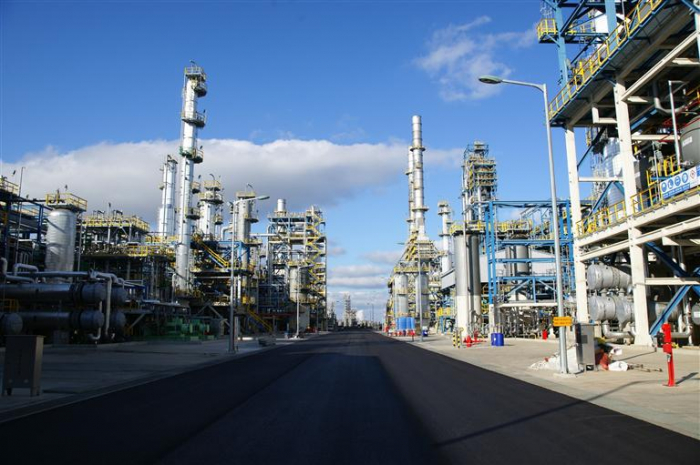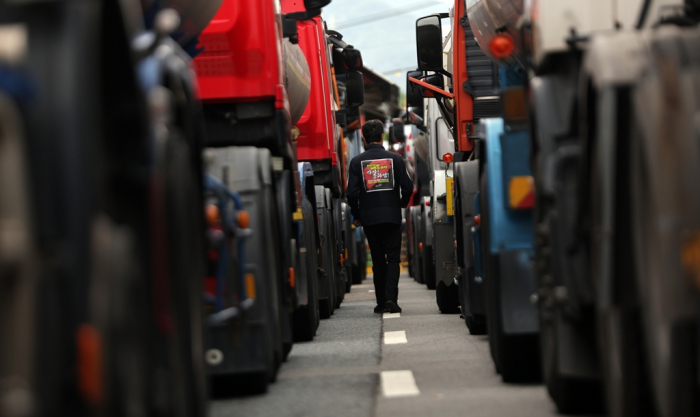Supply chain
Chemical makers to halt plants as truck driver strike deepens
The weeklong strike threatens to paralyze the entire industry in Asia’s fourth-largest economy
By Jun 14, 2022 (Gmt+09:00)
3
Min read
Most Read
LG Chem to sell water filter business to Glenwood PE for $692 million


Kyobo Life poised to buy Japan’s SBI Group-owned savings bank


KT&G eyes overseas M&A after rejecting activist fund's offer


StockX in merger talks with Naver’s online reseller Kream


Mirae Asset to be named Korea Post’s core real estate fund operator



South Korea’s petrochemical companies are set to halt operations as the work stoppage by unionized truck drivers stretched into an eighth day on Tuesday, threatening to paralyze the entire industry in Asia’s fourth-largest economy.
A major naphtha cracking facility operator in Korea’s southern industrial complex will shut its plant on Wednesday as it has been cut off supplies of naphtha, the feedstock for ethylene and propylene, widely used to make plastic and other chemical products.
Naphtha cracking centers (NCCs) at other petrochemical companies are poised to follow suit for similar reasons, as well as the lack of space to store finished products, according to industry executives.
“The suspension of NCC facilities will inevitably lead to shutdowns at downstream companies, putting the entire petrochemical industry at risk,” said Kim Pyeong-joong, an executive at the Korea Petrochemical Industry Association (KPIA), at a press conference.
Yeochun NCC (YNCC) Co., Korea’s top petrochemical producer, and seven other companies, including LG Chem Ltd., Lotte Chemical Corp. and four refiners, run naphtha cracking facilities in industrial cities such as Yeosu, Ulsan and Daesan.

If all the facilities are forced to halt operations, it will incur 300 billion won ($233 million) in daily losses, Kim said.
Korea’s naphtha cracker operators have never stopped their facilities but in 2000 China banned imports of polyethylene from Korea in retaliation for the Korean government’s decision to slap heavy import duties on Chinese garlic.
CLOGGING KOREA’S LOGISTICS VEINS
“Some petrochemical companies have already lowered their production by 90%, suffering a combined loss of 500 billion won over the past week,” said the association executive.
Lee Kwan-sup, vice chairman of the Korea International Trade Association (KITA), and heads of other industry lobby groups urged striking truckers to stop their walkout, citing ballooning losses across industries.
“The strike has already slowed cargo traffic across the country. Their industrial action is now threatening to clog the freight logistics veins and stop the heart of the domestic economy,” Lee said.
On Monday, the trade and industry ministry said the trucker strike has already cost Korea’s major industry sectors some 1.6 trillion won in lost production and unfulfilled deliveries.

Automakers, tire makers, steel companies and cement manufacturers reported production disruptions as the truck-driver strike continued.
POSCO and six other local steelmakers have posted a combined 1.15 trillion won in losses since the strike began on June 7, according to the steel industry association.
Several cement makers have also suspended their key facilities for the first time in nearly six decades, with their ex-factory shipments plunging by nearly 90% due to the weeklong strike.
Hyundai Motor Co. and Kia Corp., the country’s two largest automakers, have intermittently halted their production lines, with Hyundai’s plant operating rate falling to half its usual level last week as the company was unable to receive a timely supply of components and transport finished products.

NEED TO CHANGE SUBSIDY SYSTEM
Thousands of truck drivers belonging to the 22,000-strong Cargo Truckers Solidarity started a work stoppage last Tuesday, demanding an extension of subsidies, set to expire at year-end, that guarantee minimum wages as fuel prices rise.
Four rounds of talks with the government have so far failed to find a compromise.
State subsidies for truckers, dubbed the Safe Trucking Freight Rates System, were introduced in 2020 for a three-year run, aimed at preventing dangerous driving practices such as cargo overload while guaranteeing minimum wages for truckers.
Industry associations on Tuesday urged the government to change the system, saying that such subsidies have done little to reduce work hazards for truck drivers but instead increased transport costs by as much as 90%.
Write to Ik-Hwan Kim at lovepen@hankyung.com
In-Soo Nam edited this article.
More to Read
-
 Supply chainIndustrial losses balloon as Korean trucker strike enters 7th day
Supply chainIndustrial losses balloon as Korean trucker strike enters 7th dayJun 13, 2022 (Gmt+09:00)
3 Min read -
 EconomyKorea May inflation tops 5% for first time since 2008-09 crisis
EconomyKorea May inflation tops 5% for first time since 2008-09 crisisJun 03, 2022 (Gmt+09:00)
3 Min read -
 EconomyKorea Inc. revises business plans as rising oil prices hit economy
EconomyKorea Inc. revises business plans as rising oil prices hit economyFeb 21, 2022 (Gmt+09:00)
6 Min read -

Comment 0
LOG IN


